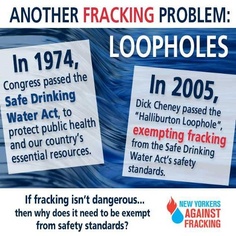 Four (4) states confirm water pollution from drilling
Four (4) states confirm water pollution from drilling
From an Article by Kevin Begos, Associated Press, January 5, 2014
Associated Press review of complaints casts doubt on industry view that it rarely happens
Story Highlights
- AP requested data on drilling-related complaints in Pennsylvania, Ohio, West Virginia and Texas
- Extracting fuel from shale formations requires salt, chemicals, heavy metals and radiation
- Most common type of pollution involves methane gas, not other chemicals
PITTSBURGH (AP) — In at least four states that have nurtured the nation’s energy boom, hundreds of complaints have been made about well-water contamination from oil or gas drilling, and pollution was confirmed in a number of them, according to a review that casts doubt on industry suggestions that such problems rarely happen.
The Associated Press requested data on drilling-related complaints in Pennsylvania, Ohio, West Virginia and Texas and found major differences in how the states report such problems. Texas provided the most detail, while the other states provided only general outlines. And while the confirmed problems represent only a tiny portion of the thousands of oil and gas wells drilled each year in the U.S., the lack of detail in some state reports could help fuel public confusion and mistrust.
The AP found that Pennsylvania received 398 complaints in 2013 alleging that oil or natural gas drilling polluted or otherwise affected private water wells, compared with 499 in 2012. The Pennsylvania complaints can include allegations of short-term diminished water flow, as well as pollution from stray gas or other substances.
More than 100 cases of pollution were confirmed over the past five years.
The McMickens were one of three families that eventually reached a $1.6 million settlement with a drilling company. Heather McMicken said the state should be forthcoming with details.
Among the findings in the AP’s review:
— Pennsylvania has confirmed at least 106 water-well contamination cases since 2005, out of more than 5,000 new wells. There were five confirmed cases of water-well contamination in the first nine months of 2012, 18 in all of 2011 and 29 in 2010. The Environmental Department said more complete data may be available in several months.
— Ohio had 37 complaints in 2010 and no confirmed contamination of water supplies; 54 complaints in 2011 and two confirmed cases of contamination; 59 complaints in 2012 and two confirmed contaminations; and 40 complaints for the first 11 months of 2013, with two confirmed contaminations and 14 still under investigation, Department of Natural Resources spokesman Mark Bruce said in an email. None of the six confirmed cases of contamination was related to fracking, Bruce said.
— West Virginia has had about 122 complaints that drilling contaminated water wells over the past four years, and in four cases the evidence was strong enough that the driller agreed to take corrective action, officials said.
— A Texas spreadsheet contains more than 2,000 complaints, and 62 of those allege possible well-water contamination from oil and gas activity, said Ramona Nye, a spokeswoman for the Railroad Commission of Texas, which oversees drilling. Texas regulators haven’t confirmed a single case of drilling-related water-well contamination in the past 10 years, she said.
In Pennsylvania, the number of confirmed instances of water pollution in the eastern part of the state “dropped quite substantially” in 2013, compared with previous years, Department of Environmental Protection spokeswoman Lisa Kasianowitz wrote in an email. Two instances of drilling affecting water wells were confirmed there last year, she said, and a final decision hasn’t been made in three other cases. But she couldn’t say how many of the other statewide complaints have been resolved or were found to be from natural causes.
In Pennsylvania, the raw number of complaints “doesn’t tell you anything,” said Rob Jackson, a Duke University scientist who has studied gas drilling and water contamination issues. Jackson said he doesn’t think providing more details is asking for too much.
“Right or wrong, many people in the public feel like PA-DEP is stonewalling some of these investigations,” Jackson said of the situation in Pennsylvania.
In contrast with the limited information provided by Pennsylvania, Texas officials supplied a detailed 94-page spreadsheet almost immediately, listing all types of oil and gas related complaints over much of the past two years. The Texas data include the date of the complaint, the landowner, the drilling company and a brief summary of the alleged problems. Many complaints involve other issues, such as odors or abandoned equipment.
Scott Anderson, an expert on oil and gas drilling with the Environmental Defense Fund, a national nonprofit based in Austin, notes that Texas regulators started keeping more data on complaints in the 1980s. New legislation in 2011 and 2013 led to more detailed reports and provided funds for a new information technology system, he said.
Anderson agreed that a lack of transparency fuels mistrust. “If the industry has nothing to hide, then they should be willing to let the facts speaks for themselves,” he said. “The same goes for regulatory agencies.”
